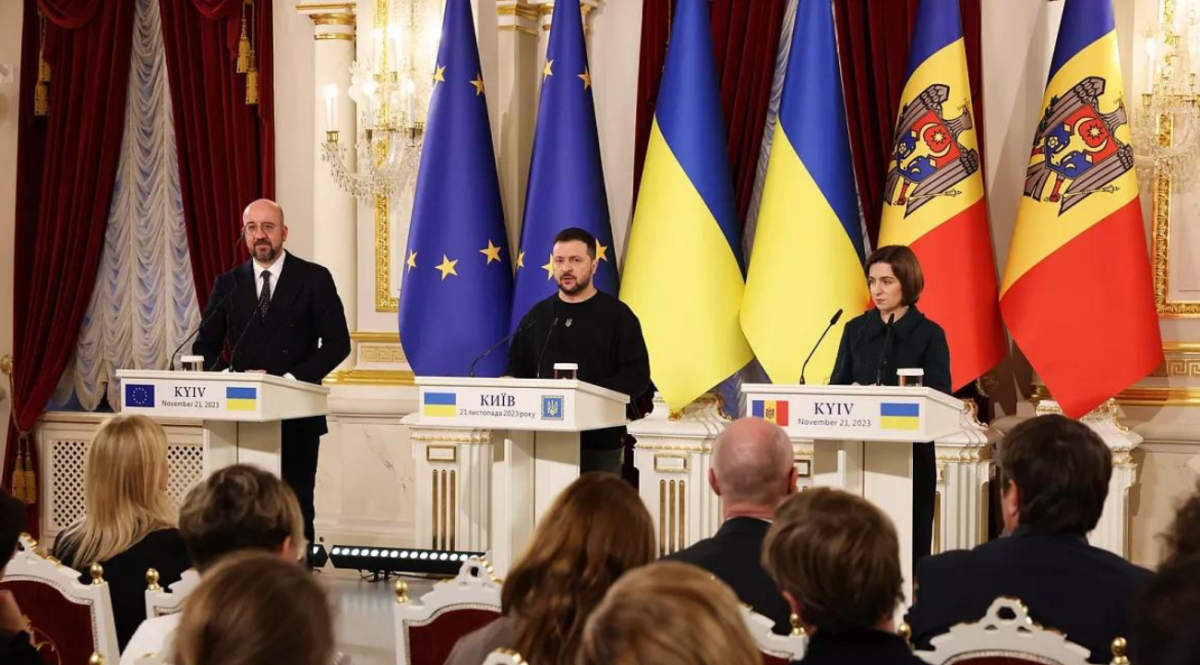Table of Contents
In a significant move, the European Union on Friday, June 21, officially sanctioned the initiation of accession discussions with Ukraine and Moldova, marking a milestone in the countries’ journey towards EU membership.
Negotiations to Commence Next Week
Officials have indicated that the negotiations will commence in Luxembourg on Tuesday afternoon, beginning with Ukraine and then proceeding with Moldova. Both countries submitted their applications to join the 27-nation EU following Russia’s invasion in 2022. This step signifies the beginning of a formal process that has been anticipated since the conflict underscored the strategic importance of integrating these nations into the European framework. The initial discussions will lay the groundwork for more detailed negotiations, focusing on aligning Ukraine and Moldova with EU standards.
Ukraine and Moldova’s EU Aspirations
Initiating these talks places the former Soviet states at the beginning of a protracted process that could take years of reforms before full membership is attained. EU leaders made a crucial decision in December to open talks with Ukraine and Moldova, despite the ongoing conflict in Ukraine. This decision underscores the EU’s commitment to supporting these countries’ aspirations amid geopolitical challenges. Both nations have expressed strong desires to integrate more closely with Europe, seeing it as a pathway to stability, economic growth, and enhanced security. The formal talks represent a significant endorsement of their ambitions and a clear message of support from the EU.
Lengthy Path to Membership
Before starting negotiations, the EU’s member states needed to approve a formal framework. The EU’s executive body informed member states earlier this month that both Ukraine and Moldova had satisfied the necessary criteria to begin the accession process. However, achieving membership will require extensive reforms in areas such as governance, rule of law, and economic stability, emphasizing that this is just the first step in a long journey. These reforms are crucial for aligning with EU standards and ensuring that the new members can integrate smoothly into the existing political and economic structures of the Union. This process will involve significant legislative and institutional changes in both countries.
Potential Obstacles Ahead
Concerns were raised about potential delays, especially with Hungary assuming the EU’s rotating presidency in July. Hungary, known for its amicable relations with Russia, indicated it did not plan to hold further talks with Ukraine during its six-month tenure. This stance could complicate and potentially stall the negotiations, reflecting internal EU dynamics and differing national interests that could influence the pace and progress of the accession talks. Other EU members will need to work diligently to ensure that the momentum is maintained and that any political roadblocks are navigated effectively. The cooperation and consensus of all member states are essential for the smooth advancement of the accession process.
EU Enlargement Momentum
Russia’s war in Ukraine has renewed the EU’s drive to accept new members, a push that had slowed in recent years. The conflict has highlighted the need for a more inclusive and secure European region, prompting the EU to reconsider its enlargement strategy. In December 2023, Georgia, another former Soviet state, was granted candidate status. Additionally, the EU approved accession negotiations with Bosnia and has ongoing talks with Serbia, Montenegro, Albania, and North Macedonia. This broader strategy of engagement with Eastern Europe indicates the EU’s long-term vision for regional stability and integration. The enlargement process is seen as a way to strengthen the EU’s geopolitical position and promote democratic values and economic development in neighboring regions.
The EU’s commitment to expansion is not just about increasing its membership but also about reinforcing its influence and stability in Eastern Europe. The ongoing negotiations with various countries demonstrate the EU’s strategic approach to fostering closer ties and supporting reforms that align with European standards. The inclusion of new members is expected to bring about significant changes and benefits for both the existing and prospective member states, contributing to a more unified and resilient Europe.
